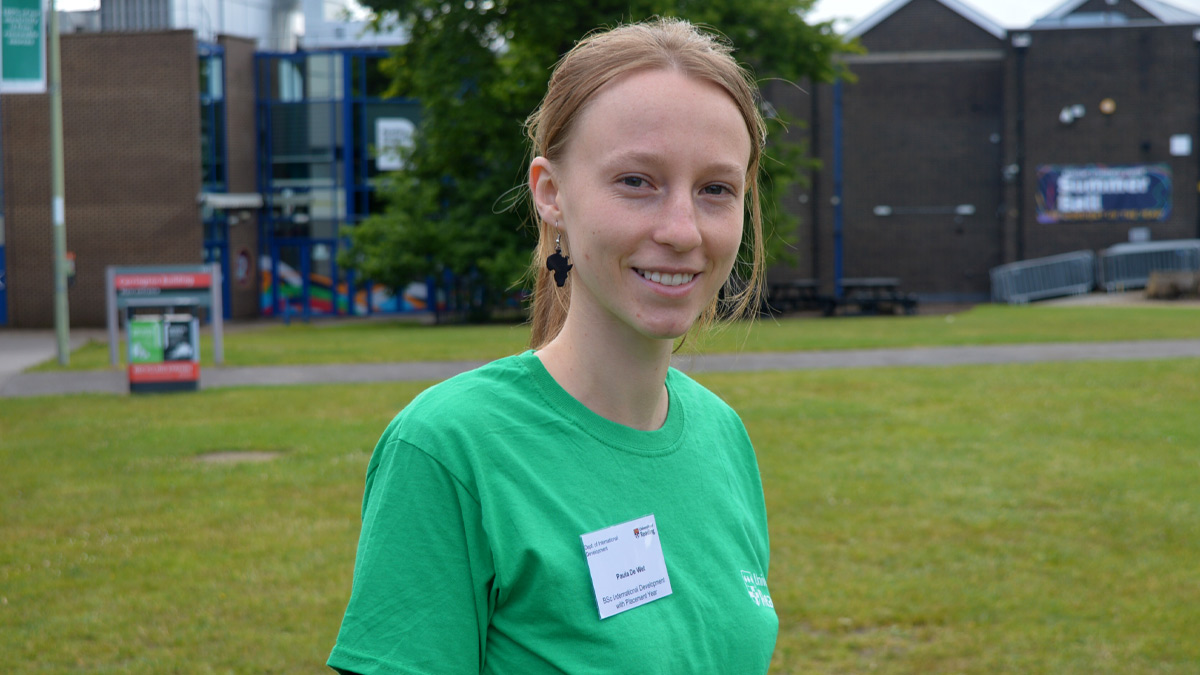Making a difference to inequality and poverty
Paula knew from a young age that she wanted to study a subject that would enable her to make a difference in a world where inequality and poverty are a ubiquitous problem.
“I chose international development because, growing up in Zambia, I was disturbed by the significant inequality around me and its impact on the quality of life of those affected. I knew I would like to be able to make a difference through my career.
The teaching I’ve experienced in the School of Agriculture, Policy and Development has been of high quality and the staff supportive and compassionate. My expectations have been exceeded, so I’m sure it was the right choice for me.”
A course that develops critical thinking
Exploring the multifaceted nature of poverty alongside other key development topics has been a highlight of the course for Paula.
“I have enjoyed developing a deep philosophical understanding of poverty – why it is damaging, the depth and multifaceted nature of its impacts, and a solid understanding of why we seek to change poverty and what that looks like.
The course has given due weight to the fact there are no ‘silver bullets’ when it comes to development, and that tailored and locally relevant approaches are always necessary.
While the first two years of the course emphasised the significance and embeddedness of poverty, the final year has provided not the answers, but the practical skills to address the challenges and reality of poverty.”
Paula has also enjoyed learning how to analyse power in the context of development, and has valued the opportunities to grow vital critical evaluation skills throughout the course.
“I have developed a greater understanding of the ubiquity of power dynamics present in every situation, from household to global level. I have also been delighted by teaching methods focused on practicing critical thinking skills and drawing out ideas through critical analysis.
I believe this has given me an invaluable understanding of a range of issues, rather than just knowledge, which will be incredibly beneficial in the future.”
Volunteering and charity work
Paula has really recognised the value of building a portfolio of experience and volunteering alongside her studies, readying her for a career in the development sector. She has embraced many opportunities to build her portfolio over the past four years.
“Through volunteering at my church’s Community Café, I developed relationships with people experiencing homelessness and long-term financial struggles, and thus gained a deeper understanding of the lived experience of poverty and its debilitating effects.”
While at the University, Paula was a founding member of the ‘Mary’s Meals Society’, further enriching her experience.
"We started the society to support ‘Mary’s Meals’, a charity that provides meals for vulnerable children in developing countries. This was a great opportunity to be a part of something that puts into practice what I was learning on my course, and to collaborate with students on other courses (including master’s and PhD students).”
Placement with the Refugee Support Group
Paula chose to undertake a placement year as part of her degree, locally in Reading at the Refugee Support Group. She gained insight into the operations of a charity, developed valuable administrative skills, contributed to case work with clients, and taught a regular English for Speakers of Other Languages (ESOL) class for adults.
“I loved my placement year and I am so proud of the skills, knowledge and personal growth I achieved, including assertiveness, confidence, safeguarding, and setting personal and professional boundaries when working in challenging situations.
Complementing my academic understanding, these skills will stand me in good stead to work with people living in poverty in a way that treats both parties with dignity, while focusing on collaborating with and empowering clients.”
Paula adds:
“I loved teaching the ESOL class, as it enabled me to build relationships with clients and support them in growing confidence in speaking the English language.
I also helped at a weekly drop-in designed to provide a safe space to reduce isolation among the client group and provide signposting to relevant services.
I realised that my personal motivation is to see people thrive through increasing independence, and so I’d like to work in future to help remove bottlenecks that restrict independence.”
Alleviating poverty in Southern Africa
Now concluding her final year of study, Paula has exciting ideas for the future.
“I feel called to work with people living in poverty in Southern Africa, so I’m moving back to Zambia to begin this journey. I’ve developed a particular interest in food insecurity, as malnutrition and chronic hunger are persistent issues. I also have a passion for agriculture that can play into this.
I would be keen to find a position in regenerative agriculture, contributing to projects that support subsistence farmers to improve crop yields sustainably in the face of changing climate conditions and increased drought. This kind of work, for me, would be a win-win – contributing to mitigating climate change through caring for the soil, and improving human nutrition and wellbeing.”
Find out more about BSc International Development with a Placement Year
Learn more about undergraduate life in the Department of International Development
